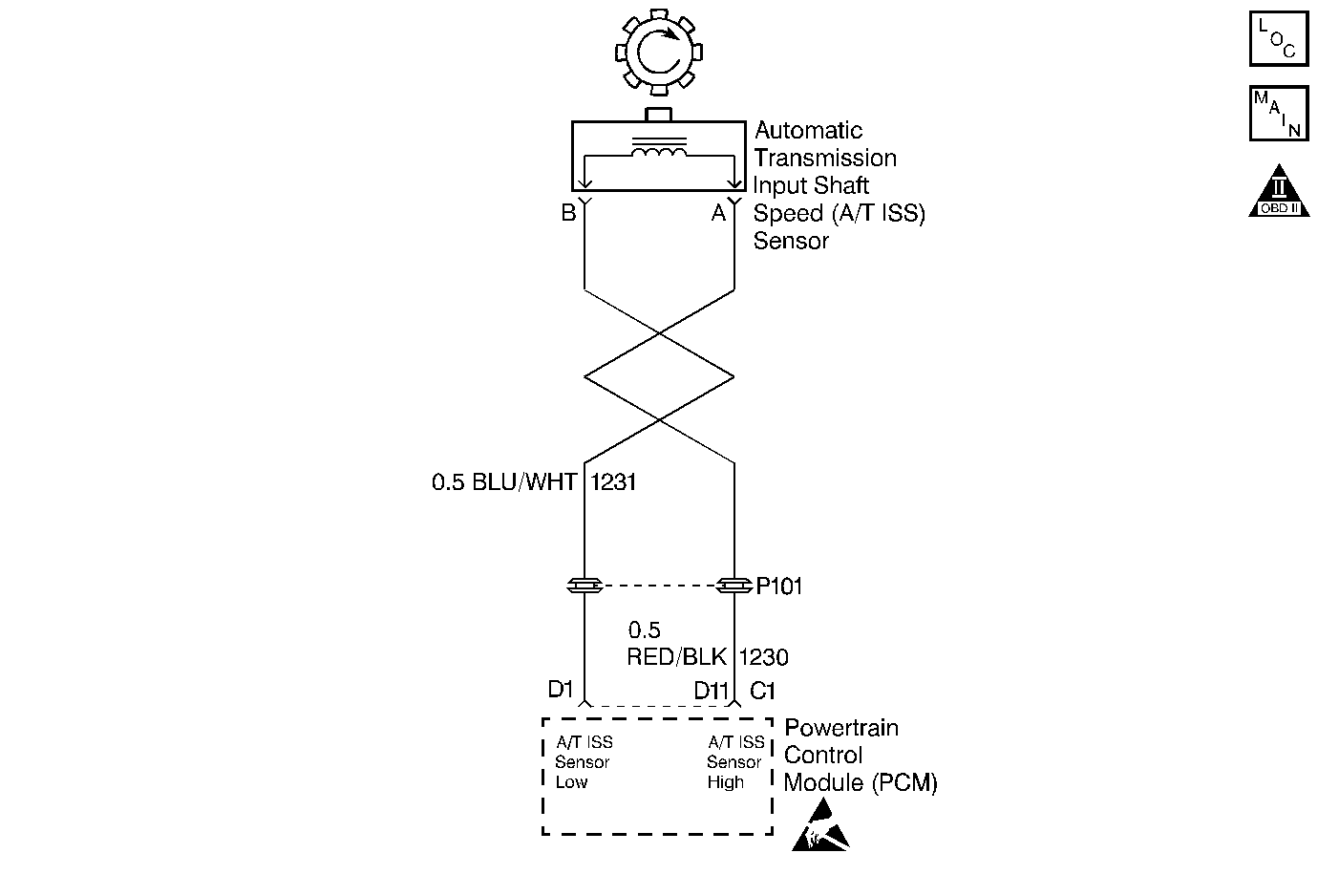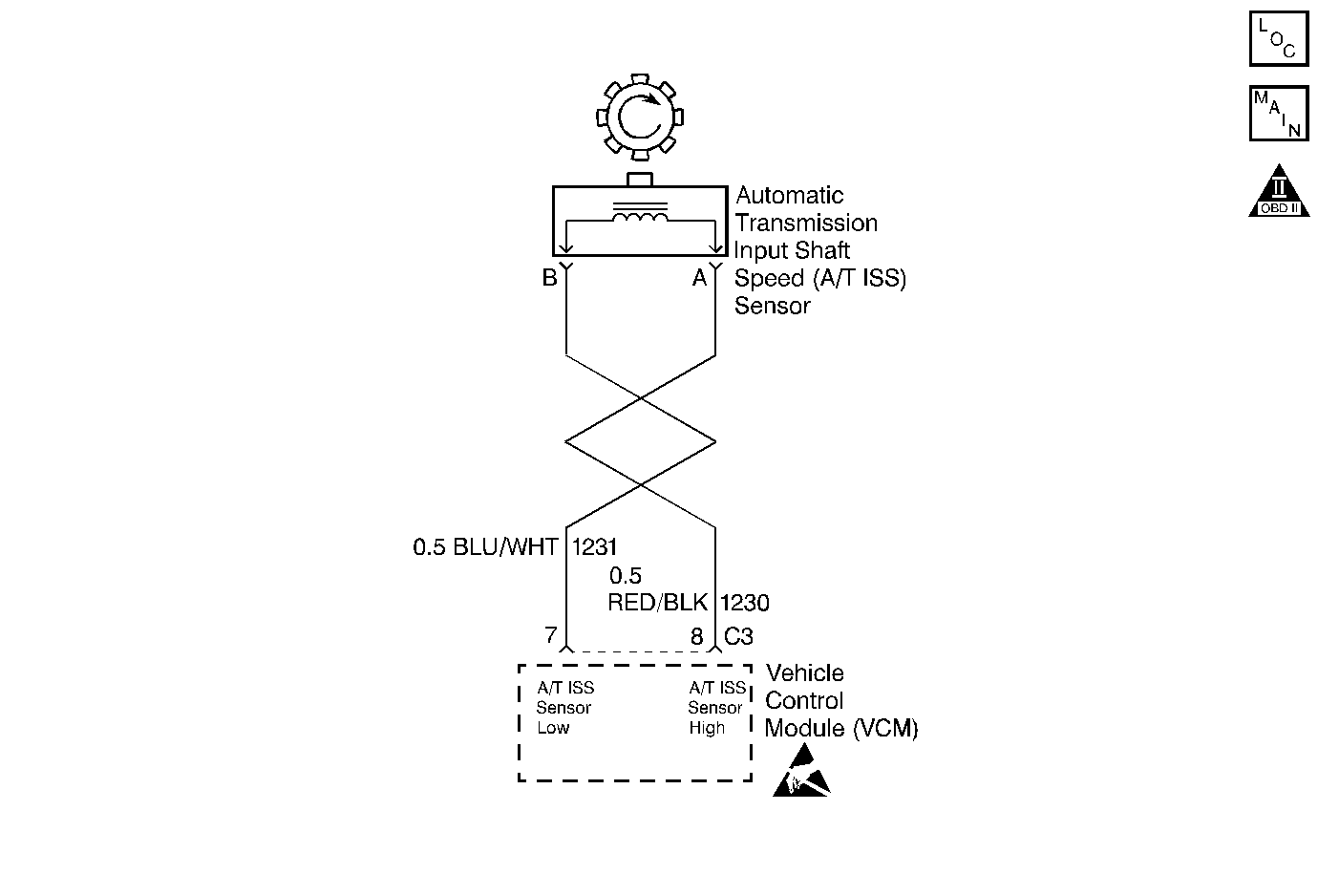DTC P0716 Input Speed Sensor CKT Range/Performance 6.5L Diesel

Circuit Description
The Automatic Transmission Input Shaft Speed (A/T ISS) Sensor consists of a permanent magnet surrounded by a coil of wire. The rotation of the forward clutch housing induces an AC voltage in the circuit. The signal voltage and frequency vary directly with the forward clutch rotational speed.
When the Powertrain Control Module (PCM) detects an unrealistically large change in input speed, then DTC P0716 sets. DTC P0716 is a type B DTC.
Conditions for Setting the DTC
| • | No A/T ISS Sensor DTC P0717 |
| • | No OSS Sensor DTCs P0722 or P0723 |
| • | No Shift Solenoid DTC P0751, P0753, P0756, P0758 |
| • | The APP Angle is greater than 15%. |
| • | The vehicle speed is greater than 20 mph. |
| • | The A/T ISS varies by more than 1200 RPM within 4 seconds. |
Action Taken When the DTC Sets
| • | The PCM commands maximum line pressure. |
| • | The PCM freezes shift adapts. |
| • | The PCM illuminates the Malfunction Indicator Lamp (MIL). |
Conditions for Clearing the MIL/DTC
- The PCM turns OFF the MIL after three consecutive ignition cycles without a failure reported.
- A scan tool can clear the DTC from the PCM history. The PCM clears the DTC from the PCM history if the vehicle completes 40 warm-up cycles without a failure reported.
- The PCM cancels the DTC default actions when the fault no longer exists and the ignition is OFF long enough in order to power down the PCM
Diagnostic Aids
| • | Inspect the wiring for poor electrical connections at the PCM Inspect the wiring for poor electrical connections at the transmission 20-way connector. Look for the following problems: |
| - | A bent terminal |
| - | A backed out terminal |
| - | A damaged terminal |
| - | Poor terminal tension |
| - | A chafed wire |
| - | A broken wire inside the insulation |
| • | When diagnosing for an intermittent short or open, massage the wiring harness while watching the test equipment for a change. |
| • | You may have to drive the vehicle in order to experience a fault. |
| • | First diagnose and clear any engine DTCs that are present. Then inspect for any transmission DTCs that may have reset. |
Test Description
The numbers below refer to the step numbers on the diagnostic table.
-
This step tests for proper operation of the A/T ISS Sensor.
-
This step tests for proper A/T ISS Sensor circuit operation up to the PCM connections. You remove the Fuel Sol. Fuse in order to eliminate a flooding condition during this step.
-
This step tests for a short to ground in the A/T ISS Sensor circuit.
Step | Action | Value(s) | Yes | No | ||||
|---|---|---|---|---|---|---|---|---|
1 | Was the Powertrain On-Board Diagnostic (OBD) System Check performed? | -- | ||||||
2 |
Important: Before clearing the DTCs, use the scan tool in order to record the Freeze Frame and Failure Records for reference. The Clear Info function will erase the data. Does the Transmission ISS RPM change by more than 1200 RPM at steady engine speed? | -- | ||||||
3 |
Is the A/T ISS Sensor resistance within the specified value? | 1042-2088ohms | ||||||
Is the DMM voltage steady? | Greater than 0.5 volts AC | |||||||
5 |
Is either voltage reading greater than the specified value? | 10.5 volts DC | ||||||
6 |
Refer to Electrical Diagnosis, Section 8. Did you find a problem? | -- | ||||||
7 | Repair the short to power in circuits 1230 and/or 1231. Is the repair complete? | -- | -- | |||||
Refer to Automatic Transmission Components . Is the voltage greater than the specified value and steady? | 0.4 volts AC | |||||||
9 | With the J 39200 DMM measure the resistance between terminals C1-D1 and C1-D11 of the C1 connector. Is the circuit resistance within the specified value? | 1042-2088ohms | ||||||
Is either resistance less than the specified value? | 50kohms | Go to Diagnostic Aids | ||||||
11 |
Refer to Electrical Diagnosis, Section 8. Did you find and correct the problem? | -- | -- | |||||
12 | Is the resistance reading from Step 9 less than the specified value? | 1042-2088ohms | ||||||
13 | Repair circuits 1230 and 1231 for a short together. Is the repair complete? | -- | -- | |||||
14 |
Refer to Electrical Diagnosis, Section 8. Did you find and correct a problem? | -- | -- | |||||
15 | Replace the A/T ISS Sensor. Refer to Speed Sensor Replacement, in On-Vehicle Service. Is the replacement complete? | -- | -- | |||||
16 | Inspect the PCM pins and connector terminals for corrosion or weak tension. Did you find a problem? | -- | ||||||
17 | Replace the PCM. Refer to Powertrain Control Module Replacement/Programming , Section 6. Is the replacement complete? | -- | -- | |||||
18 | In order to verify your repair, perform the following procedure:
Important: Failure to clear codes first may cause poor engine performance and high idle at start up.
Has the test run and passed? | -- | System OK |
DTC P0716 Input Speed Sensor CKT Range/Performance 5.7L and 7.4L Gas

Circuit Description
The Automatic Transmission Input Shaft Speed (A/T ISS) Sensor consists of a Permanent Magnet (PM) surrounded by a coil of wire. The rotation of the forward clutch housing induces an AC voltage in the circuit. The signal voltage and frequency vary directly with the forward clutch rotational speed.
When the Vehicle Control Module (VCM) detects an unrealistically large change in input speed, then DTC P0716 sets. DTC P0716 is a type D DTC. For California emissions vehicles, DTC P0716 is a type B DTC.
Conditions for Setting the DTC
| • | No Throttle Position (TP) Sensor DTCs P0121, P0122, or P0123 |
| • | No A/T ISS Sensor DTC P0717 |
| • | No OSS Sensor DTC P0502 or P0503 |
| • | No Shift Solenoid DTC P0751 or P0753 |
| • | The throttle position is greater than 18%. |
| • | The vehicle speed is greater than 25 mph. |
| • | The transmission is not in Park or Neutral. |
| • | The engine is running for 8 seconds and not in fuel cut off. |
| • | The input speed varies by 1300 RPM for greater than 5 seconds. |
Action Taken When the DTC Sets
| • | The VCM commands D2 line pressure. |
| • | The VCM freezes shift adapts. |
| • | For California emissions only, the VCM illuminates the Malfunction Indicator Lamp (MIL). |
Conditions for Clearing the DTC
- For California emissions vehicles, the VCM turns OFF the MIL after three consecutive ignition cycles without a failure reported.
- A scan tool can clear the DTC from the VCM history. The VCM clears the DTC from the VCM history if the vehicle completes 40 warm-up cycles without a failure reported.
- The VCM cancels the DTC default actions when the fault no longer exists and the ignition is OFF long enough in order to power down the VCM.
Diagnostic Aids
| • | Inspect the wiring for poor electrical connections at the VCM. Inspect the wiring for poor electrical connections at the transmission 20-way connector. Look for the following problems: |
| - | A bent terminal |
| - | A backed out terminal |
| - | A damaged terminal |
| - | Poor terminal tension |
| - | A chafed wire |
| - | A broken wire inside the insulation |
| - | The A/T ISS Sensor harness being near the DIS components or the ignition wires. |
| • | When diagnosing for an intermittent short or open, massage the wiring harness while watching the test equipment for a change. |
| • | First diagnose and clear any engine DTCs or TP Sensor codes that are present. Then inspect for any transmission DTCs that may have reset. |
Test Description
The numbers below refer to the step numbers on the diagnostic table.
-
This step tests for proper operation to the A/T ISS Sensor.
-
This step tests for proper A/T ISS circuit operation up to the VCM connections. Remove the fuel pump relay in order to eliminate a flooding condition during this step.
Step | Action | Value(s) | Yes | No | ||||||
|---|---|---|---|---|---|---|---|---|---|---|
1 | Did you perform the Powertrain Diagnostic System Check? | -- | Go to Powertrain On Board Diagnostic (OBD) System Check Section 6E3 | |||||||
Important: Before clearing the DTC, use the Scan Tool in order to record the Freeze Frame and Failure Records for reference. The Clear Info function will erase the data. With the drive wheels rotating, does the Scan Tool Transmission ISS increase with the drive wheel speed? | -- | Go to Intermittent Conditions in Engine Controls | ||||||||
3 |
Does the resistance measure within the specified range? | 1377-3355 Ω | ||||||||
4 | Measure the resistance from terminal C3-7 to ground. Does the resistance measure greater than the specified value? | 50 K Ω | ||||||||
Refer to General Electrical Diagnosis Procedures in Wiring Systems. Did you find and correct the condition? | -- | |||||||||
6 |
Does the resistance measure within the specified range? | 1377-3355 Ω | ||||||||
7 | Was the resistance measured in Step 3 greater than the specified value? | 3355 Ω | ||||||||
8 |
Refer to General Electrical Diagnosis Procedures in Wiring Systems. Did you find and correct the condition? | -- | -- | |||||||
9 |
Refer to General Electrical Diagnosis Procedures in Wiring Systems. Did you find and correct the condition? | -- | -- | |||||||
10 | Test the high circuit (CKT 1230) and the low circuit (CKT 1231) of the ISS assembly for a short together. Refer to General Electrical Diagnosis Procedures in Wiring Systems. Did you find and correct the condition? | -- | -- | |||||||
11 | Replace the ISS assembly. Refer to Vehicle Speed Sensor Replacement . Did you complete the replacement? | -- | -- | |||||||
12 | Replace the VCM. Refer to VCM Replacement/Programming in Engine Controls. Did you complete the replacement? | -- | -- | |||||||
13 | Perform the following procedure in order to verify the repair:
Has the test run and passed? | -- | System OK |
